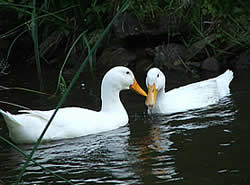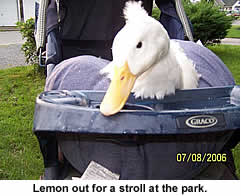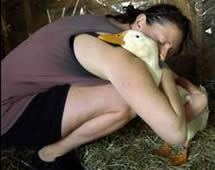|
Mating for Life
Itís
easy to see that many of the domestic ducks and geese at Majestic
share deep friendships, but do they mate for life?
 We
find that domestic ducklings and goslings raised up together form
the tightest bonds. As a result, when we rescue ducks off of ponds,
it is usually evident which of them were raised together. In
addition to preferring one anotherís company over that of other
flock members (especially when the mating season comes to a close),
they exhibit similar behaviors and preferences. As an example:
Puddles, Echo and Jeru were all rescued off of the same pond
together. Although the three are very close friends, Puddles and
Jeru enjoy being held and pet in a particular way, which differs
slightly from Echo and the other ducks in the sanctuary. Therefore,
we know that Puddles and Jeru were raised together and subsequently
abandoned together. We
find that domestic ducklings and goslings raised up together form
the tightest bonds. As a result, when we rescue ducks off of ponds,
it is usually evident which of them were raised together. In
addition to preferring one anotherís company over that of other
flock members (especially when the mating season comes to a close),
they exhibit similar behaviors and preferences. As an example:
Puddles, Echo and Jeru were all rescued off of the same pond
together. Although the three are very close friends, Puddles and
Jeru enjoy being held and pet in a particular way, which differs
slightly from Echo and the other ducks in the sanctuary. Therefore,
we know that Puddles and Jeru were raised together and subsequently
abandoned together.
It is worth
mentioning that ducks who have spent a great deal of time together
and who are later separated will often recognize one other upon
being reunited again, even after long periods of time. Furthermore,
we have also seen them recognize owners who they have not seen in
over a year. Their memories are quite good, as with geese.
We have a few
ducks and geese listed as adoptable on the site who we are trying to
place together in a home. They are usually boys with tight
friendships who have definitely been around each other for a long
time, if not always. We try to place these duos and trios together,
but ultimately, ducks can be fickle. Most often, it is more
important to find wonderful homes for ducks rather than trying to
ensure that everyone goes together (geese are another story).
Just because
ducks do not mate for life, doesnít mean that they do not feel loss
when a member of their flock is no longer presentómale or female. As
we adopt ducks out, sometimes their close friends, still remaining
at the sanctuary, feel remorse. On these occasions, they will
actively search and call for their missing partner. When this
happens, we immediately introduce a new roommate or put them in a
different pen with new neighbors. This adds a great deal of
excitement to their routine and will usually provide an instant
distraction for them, which will ease them through their transition.
We have had excellent results utilizing this tactic.
Drakes and hens
that are adopted out will normally form immediate bonds with their
new flock mates of the opposite gender and never look back. They get
very excited upon introductions and get right to becoming acquainted
with their new friends.
Normally, a
single drake will try to mate with as many hens as are available to
him, although he may single out a few favoritesówith the favorites
frequently changing. Hens may tend to favor a particular drake, but
they often change their minds and can be quite fickle as well. New
sanctuary drakes often tickle a henís fancy upon arrival and coax
them into changing their loyalties. Most ducks are very curious and
very flirtatious.
There are rare
occasions when a pair of ducks seem to prefer one otherís company
solely above all others. In fact, of all the rescues we have done,
only Tiny Tim and Phoebe ever demonstrated this trait. Timmy and
Phoebe came off of the same pond with nearly a dozen other ducks. It
didnít take us long to learn that when Phoebe was not in Timmyís
immediate presence he grew unruly and was a ferocious biter. Once we
discovered that she was the source of his happiness and we set the
two in their own pen together, the barn was a much happier place.
Even though Timmy fawned over and favored Phoebe, when he went to
his new home with other hens he did not remain monogamous.
For the most
part, domestic ducks do not mate for life; however, there are always
exceptions when it comes to the heart.
Geese on the other
hand are more widely known for their close and loving bonds between
pairs. A gander will ferociously protect and covet his hen, much
more so than ducks. Geese are known to mate for life. If separated,
both geese will mourn the loss, frequently calling out. Whether or
not they find a new mate often depends on the bird. However, as with
ducks, there can be exceptions. Geese also differ than ducks in that
both parents will tend to the goslings; whereas, ducklings are only
tended to by their mothers.
Sanctuary geese Ali
and Chan are both ganders; still, when Ali left the site for a brief
trip to the vetís office, Chan desperately called out for his best
friend during the entire two hours that Ali was away. Even when we
sat with Chan and kept him company, his sorrow was not eased. When
Ali came home and was released from his crate, the two boys ran to
the pond together, took turns draping their necks over one another
other and then swam in joyous circles.
This Duck's No Lemon!
We
are so accustomed to receiving emails regarding hatching programs
gone awry in schools and the homeless ducklings that are the result,
that we were pleasantly surprised to receive a different kind of
email. This is the story of a responsible teacher who hatched out a
lame duckling named Lemon in her classroom.
Laura is a
Kindergarten teacher who prearranged a good home for four Pekin
ducklings before hatching them out in her classroom. She was well
educated on proper techniques and had her waterfowl vet lined up in
case of emergency. Upon hatching, she discovered that one of the
ducklings, a little hen named Lemon, was lame and had some
neurological issues. She brought the duckling to the vet for
examination and she also contacted us for some general care advice.
Lemon not only
taught students about egg to duckling development, but also an
important lesson about animals with special needs. Lemon is not a
throw away duck, not a mistake, not a project gone wrong, but rather
a very special duck with very special needs. Students learned a
valuable life lesson from Lemon and from their teacher.
Imperfections do not make animals disposable or unworthy of love.
Students and teachers alike assisted in Lemonís special care,
holding and petting her frequently throughout the day.
Laura kept custody of Lemon, taking her home every day and allowing
her daily swims in her tub to ensure that her legs are as strong as
they can be. To strengthen her neck muscles, which help her reach
her oil gland, Laura holds earthworms (one of Lemonís favorite
snacks) over Lemonís oil gland and makes Lemon reach back both to
her right and to her left to get her snacks. Lemon also takes
vitamins to help her stay strong and vibrant.

Laura
and her friends have constructed a harness out of a small life
preserver, which enables them to hold the straps and allow Lemon to
feel what itís like to stand up. They also put her in a stroller and
take her for walks at their local park. Although she will most
likely never walk, Lemon is given experiences and exercises that
stimulate and enrich her life.
Lemon's Website
Waterfowl Enrichment
Activities
Turn on the sprinklers!
Lawn
sprinklers or even a simple garden hose sprayed in the air can make
a ton of fun for your ducks and geese. Waterfowl who are new to this
experience may run at first, but eventually a hot day will come and
they will just turn their bellies to the spray for a good cool off.
Ducks and geese model behavior from one another, so if you can get
one of your flock members to turn their belly to you, the others
will most likely watch and eventually learn to do it too.
 To
avoid injuries, be careful not to chase your waterfowl with water
spray. Let them learn to come to you. Begin by getting them
accustomed to the site of spraying water and then, over the course
of time, close the gap. Aim the water at their feet when teaching
your waterfowl not to be afraid; when they get used to this, lift
the spray up to their tummies. To
avoid injuries, be careful not to chase your waterfowl with water
spray. Let them learn to come to you. Begin by getting them
accustomed to the site of spraying water and then, over the course
of time, close the gap. Aim the water at their feet when teaching
your waterfowl not to be afraid; when they get used to this, lift
the spray up to their tummies.
Make 'em
mud wrestle!
We can never say enough
about this enrichment activity. Whatever the attraction is, it will
keep your flock happily engaged for a long time as they sift through
it. Make a mud puddle and let them play in it. Be sure to have your
camera ready because you are about to be pleasantly surprised.
 This
adventure is best followed by a good swim! This
adventure is best followed by a good swim!

Break out the kiddie pool!
Kiddie pools
are a yearlong adventure for your
flock. Be sure to keep pools clean, and by clean we donít mean
ďclearĒ we mean ďfresh.Ē Ducks and geese will often mess up their
water with mud within minutes of a filling. Be sure water is not
allowed to go stagnant or ferment. Pools should be emptied and
refilled daily, especially in summer. For added fun toss some treats
into the kiddie pool. Healthy veggie snacks added to a pool
can provide an excellent source of enrichment for your waterfowl.
 Another
great idea is to buy a dozen live bait fish from your local
bait shop. Let them go in a kiddie pool and watch how your ducks and
geese react. Some ducks and geese will simply watch curiously,
others will jump in and try to catch lunch, yet others may take some
time to get used to the idea of sharing their pool. Another
great idea is to buy a dozen live bait fish from your local
bait shop. Let them go in a kiddie pool and watch how your ducks and
geese react. Some ducks and geese will simply watch curiously,
others will jump in and try to catch lunch, yet others may take some
time to get used to the idea of sharing their pool.
Join them for a swim!
Swimming is not only
enriching for them, but for you as well. If you have a water source
on your property and are accustomed to standing on shore and
watching your flock play around, shake things up a bit and jump in
the water with themóor take a ride out on a small inflatable boat.
You will experience a whole new level of interaction with your birds
when you share the water with them. Donít have a pond? Get a big
kiddy pool and sit down in it with themódonít worry, a little duck
poop wonít hurt you!
Dig up some tasty critter
snacks!
Nightcrawlers
are one of the favorite treats of most ducks. You can
either dig them up yourself or purchase them. If you purchase them,
your flock will soon recognize the container they come in and will
get very excited at the site of the snacks approaching. Ducks will actually hop up to snatch these little buggers out of
your hands. They canít get enough of them!
 If
you are going to dig up your own earthworms, be sure to keep your
waterfowl away from your shovel. Our flock members know that when
they see a shovel come out of the barn worms will be served. They
get very excited and must be penned away from the digging site to
avoid any safety hazards. Overeager waterfowl will poke their bills
dangerously out under a shovel blade in an instant. If
you are going to dig up your own earthworms, be sure to keep your
waterfowl away from your shovel. Our flock members know that when
they see a shovel come out of the barn worms will be served. They
get very excited and must be penned away from the digging site to
avoid any safety hazards. Overeager waterfowl will poke their bills
dangerously out under a shovel blade in an instant.
Make them do the work!
Another
fun way to introduce worms to your ducks is to take a small bucket,
dump a dozen worms into the bottom, add a small amount of water.
Then, dig up a clump of grass, with plenty of soil in the roots. Get
the soil good and wet without washing it away. Set the clump of
grass into the bucket and give the worms a few hours to work their
way into the soil of the roots. Later, take the grass clump out of
the bucket, get it good and wet, so the soil is muddy and workable.
Lay it down on the ground in your duck pen, so the soil/root side is
face up. Your ducks will love digging through the roots and mud in
search of the treasures hidden inside.
Set up lights to attract
bugs!
This is a great evening adventure for your flock. As the sun sets,
place a flashlight or lantern in your waterfowl enclosure. Your
flock may be nervous of it at first, but once they see the bugs
begin to gather around it, they will lose their fear quickly and
come in for a tasty treat.
Go exploring!
Adventures to new and
unexplored areas of the yard are a great treat for your flock. After
inspecting an area and confirming that there are no hazards, escort
your flock members on an exploration. They will love you for it.
Majestic
Farewell...
 Joven
was an amazing rescue who has been sharing his hugs openly with us
and with nearly every visitor who has passed through the doors of
our sanctuary. Joven
was an amazing rescue who has been sharing his hugs openly with us
and with nearly every visitor who has passed through the doors of
our sanctuary.
Our hearts were saddened by his sudden
and unexpected loss this July.
Best friend of Elijah, our arms will
always miss you, dear boy... Your spirit is so beautiful and has
inspired so many to love...
|